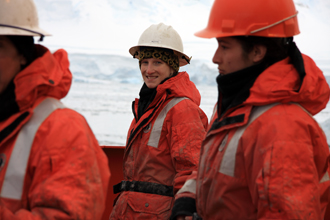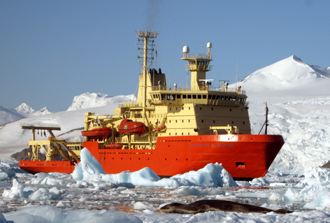Antarctic Explorer
Kimberly Roe, a doctoral student in earth and environmental sciences, embarked to Antarctica earlier this semester as part of an expedition funded by the National Science Foundation.

Kimberly Roe, center, a PhD candidate in earth and environmental sciences, embarked to Antarctica on a complex expedition to study climate change. (Photos from Kimberly Roe)
During her second time visiting the Antarctic Peninsula, Roe's role included sharing stories and photos on the cruise's weekly blog as well as helping to collect sediment cores and water samples. National Geographic followed the expedition.
Thirty scientists from four countries were on the two-month trip, led by Eugene Domack, geosciences professor at Hamilton College, which is where Roe earned an undergraduate degree in 2008. Scientists hoped to study abrupt environmental changes in Antarctica's Larsen Ice Shelf System.
However, the ship, the Nathaniel B. Palmer, never made it to the Larsen System because of unexpected ice blocking its passage. Nevertheless, work in other areas of the Antarctica Peninsula will contribute to understanding global climatic changes where they occur with greatest magnitude and what the impact is upon the environment.
For Roe, it was a thrill to be onboard ship with scientific luminaries in her field.

The Nathaniel B. Palmer, a research ship with icebreaking capability, waits amid the Antarctic ice during the scientific expedition.
"In the midst of helping, I would strike up these conversations with the lead scientists and get ideas for my own projects," Roe says. She went from knowing the scientists by reading their papers in scientific journals to playing pickup basketball with them.
At Tulane, Roe is helping her adviser, Brad Rosenheim, assistant professor of earth and environmental sciences, build a stable isotopes lab in which they can study climate change by examining organic carbon particles.
With a Louisiana Board of Regents fellowship, Roe has four years of support to pursue her PhD. In her career, she wants to inform people about how to make decisions with the Earth in mind.
"We think we can do what we want, and the Earth will always be here. People need to understand how the Earth responds to our actions, and that our actions have implications."
